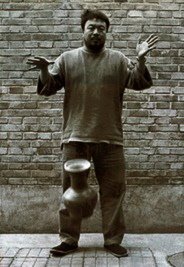Over the last semesta or so I have begun to recognize a couple of important facts, the first maybe I should have always noted but didn’t, that primary education may well be the most important stage of education and have the most lasting impact, the second, that the structure for teaching English in Primary Schools in Xi’an is generally pretty poor.
When I studied for a PGCE in the UK, we were required to organize a two-week placement in a primary school before our training in the secondary school system commenced. The idea was to get a sense of where the pupils were coming from. The over-riding impression I was left with, was that after only the first few years of primary school most students’ academic level and subsequent achievement was laid out for them- somewhat of a disaster really in educational terms.
In terms of teaching a foreign language in China, it is quite obvious to see the importance of the foundations that are laid in matters of language acquisition and, we have to include it, levels of discipline in the Primary school sector. In the various schools I have taught in there are quite different standards already appearing, even in equally affluent areas, though particularly where the wealth of the parents has a major influence. In China, with the emphasis on continual extra-curricular studies for children, wealth makes a big difference to a child’s ability. However, that aside, it is enough for now just to comment a little on the poor structure of the teaching of English in most, if not all of the schools here.
In one of the schools I teach in the senior students, in grades 5 and 6, have a co-ordinated programme of study and homework with a Chinese-English teacher but no foreign-teacher, the younger students, grades 1-4, have an external foreign teacher but no qualified Chinese-English teacher and no structured programme of homework. The foreign teachers are supplied by external private language schools. It is not my intention here too analyze the nature of private business practices on schools and schooling, as I am sure I will do that at a later date, particular with the profusion of private English teaching institutions already here in China and which are exceptionally influential in the extra-curricula sphere. The exam in Grade 6 is of great importance, so maybe the thinking by the school above is to have a full-time Chinese-English teacher for the upper grade so to prepare the students as best they can for their exam in the short time they have available, having not previously had English as a compulsory subject. However, I would argue the most important aspect would be first to make sure that a reliable and comprehensive programme of study is set in place for the younger students, so that in 5 years time they have the best possible chance that they can for achievement. It seems that every year that these changes are not implemented it constitutes an abdication of responsibility for these young children's education.
The exam in Grade 6 is of great importance, so maybe the thinking by the school above is to have a full-time Chinese-English teacher for the upper grade so to prepare the students as best they can for their exam in the short time they have available, having not previously had English as a compulsory subject. However, I would argue the most important aspect would be first to make sure that a reliable and comprehensive programme of study is set in place for the younger students, so that in 5 years time they have the best possible chance that they can for achievement. It seems that every year that these changes are not implemented it constitutes an abdication of responsibility for these young children's education.
The problem is in the nature of a results based education policy and the emphasis that is placed on last-minute fulfilment of requirements and not a reasonable thought through process of knowledge acquisition, from the most suitable source. In some contexts, this may be multi-media based educational provision or closer to the issues involved here, whether the teacher is foreign or Chinese, or both, and if both how the work between the two can be co-ordinated so to be relevant and comprehensive. It would seem obvious that a results based education and a well structured process of education are not mutually exclusive aspects, however they often seem to be treated as such.
The main concern I have is that foreign teachers are not being used correctly and that they should supplement the Chinese- English teachers work and should certainly not be left to be the soul provider of the early years students foreign language education. Though this would be based on the postulate that the Chinese teachers know what they are doing in the first place and that the resources and syllabus available are relevant. I will continue this theme next week with another couple of examples from the other schools I am presently teaching in.
Friday, 27 February 2009
Primary School Practices In Xian. Part I
Subscribe to:
Post Comments (Atom)












No comments:
Post a Comment